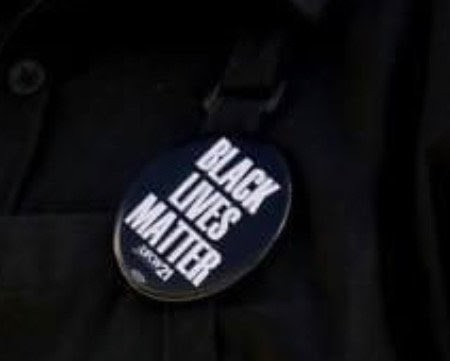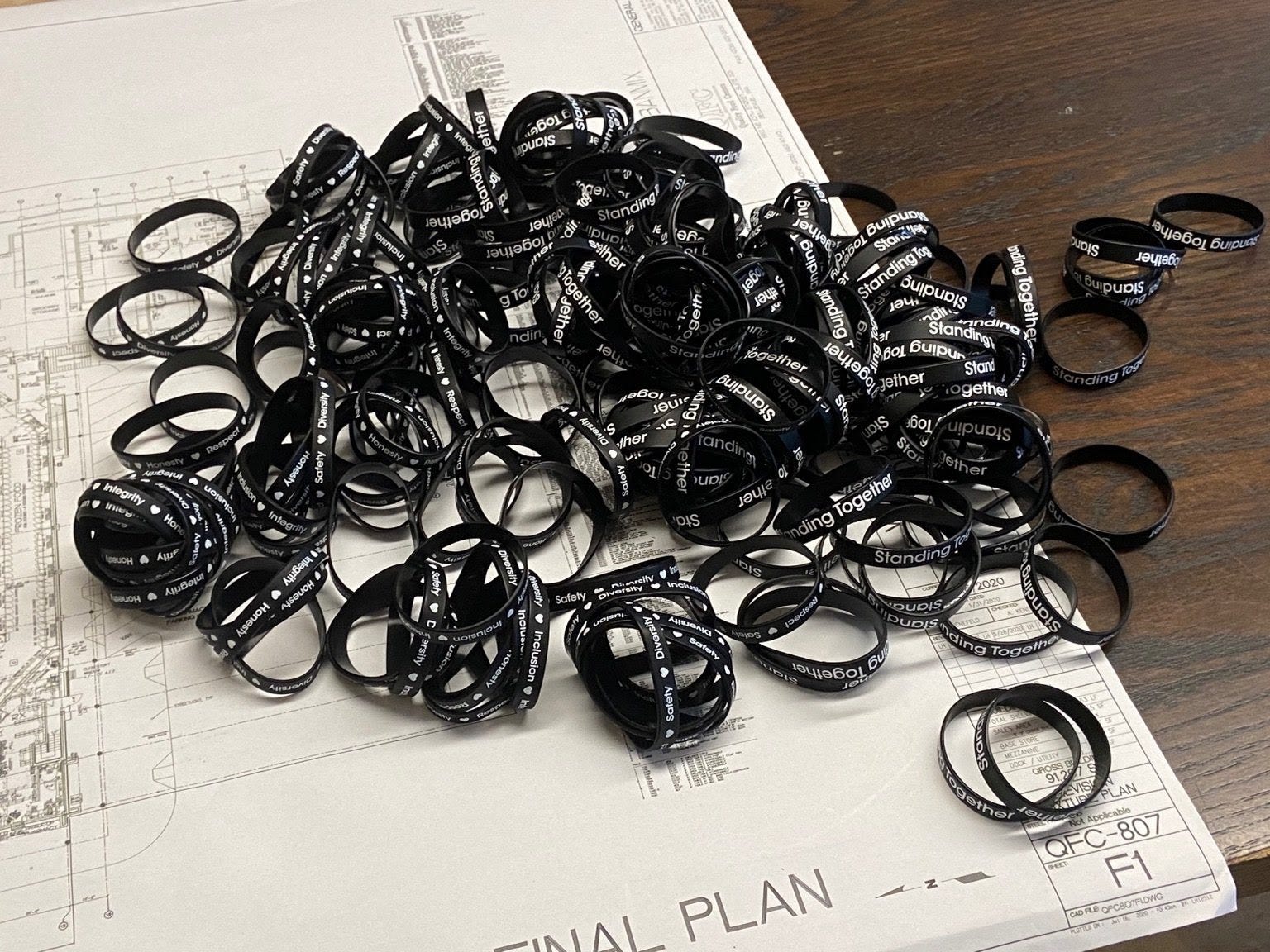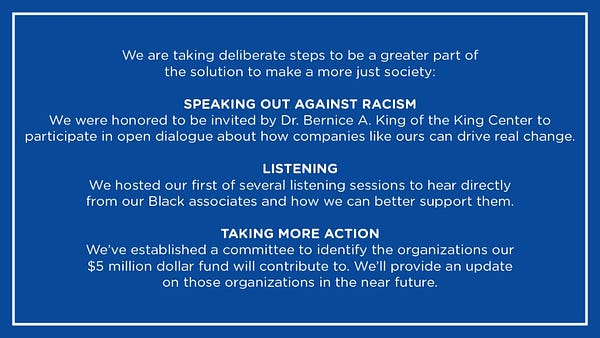Kroger CEO Rodney McMullen, who runs the nation's largest chain of grocery stores, has publicly embraced the Black Lives Matter movement. In a video posted to Twitter on June 5, McMullen said that Kroger "must use our voice to express we are against racism and injustice in the black community" and promised that the company was allowing "associates to openly share their thoughts, feelings, and experiences with discrimination."
So many of our associates, families, friends, customers, and communities are hurting, frustrated, and angry. The senseless killing of George Floyd, Breonna Taylor, Ahmaud Arbery and so many more — too many more across our country — has shaken us to our core. We share in feelings of sadness, fear, and outrage. We must use our voice to express we are against racism, and injustice in the black community… We are creating more opportunities for associates to openly share their thoughts, feelings, and experiences with discrimination… To our black associates, customers, and allies: we see you, we hear you, we support you, and I stand with you.
This sentiment was expressed repeatedly on social media. On June 12, the company promised to "better support our Black associates, customers, and allies."
But the experience of Black associates at Kroger and its subsidiaries has been much different. Motoko Kusanagi has worked at QFC, a Kroger brand, in Washington State for two years. In August, the union that represents workers at Kusanagi's store, UFCW, provided workers with small "Black Lives Matter" pins.
 |
Kusanagi and about 20 other associates soon began wearing the pins during their shifts. But Kusanagi began to notice fewer and fewer workers wearing the pins. She eventually learned that the store director was telling associates one by one to remove the pins because "some customers may find this offensive." Eventually, Kusanagi was told by a manager to remove her pin because it was company policy.
Kusanagi and a few other employees have continued to wear the pin anyway. "When I got that explanation, I wasn't satisfied. It seems like we are protecting the feelings of racist people," Kusanagi said.
Workers were told that, instead of Black Lives Matter pins, they could wear one of two company-provided wristbands. One says "Standing Together," and the other lists Kroger's corporate values — "Integrity. Honestly. Respect. Safety. Diversity. Inclusion."
In an email to associates, Kroger said that these wristbands represent a commitment to "Standing Together with our Black associates, customers, and communities against racism of all forms."
Kusanagi described these wristbands as "corporate nonsense." It appears most of her colleagues agree. Kusanagi has only seen one employee wear a wristband and a pile of them sit, unused, in the employee breakroom.
 |
Eventually, Kusanagi spoke to her local union, UFCW 21, and learned that other Kroger employees in the area were having similar problems at their stores. UFCW 21 has filed a "filed formal grievances" against two Kroger subsidiaries "as well as an unfair labor practice charge under federal labor law." According to the complaint, at least one employee of a Kroger-owned store was sent home for refusing to remove the button.
In a statement, Kroger confirmed that Black Lives Matter buttons were prohibited in all company stores. The company claimed it was not "directly related to BLM" but an application of "an existing dress code that reflects no text or large logos of any kind." Kroger claims that the company-produced wristbands are a "consistent solution" for employees who "desire to stand together with their communities and show their support."
The dress code, however, is not enforced against other messages. Tom Gieger, a spokesperson for UFCW 21, says that Kroger workers have worn union buttons at work for years with no issues. Kusanagi noted that, in June, the company passed out "Pride" buttons for employees to wear.
The unfair labor complaint
The union is arguing that the "Black Lives Matter" buttons it provided to workers was protected "concerted activity." In labor law, concerted activity refers to the right of workers to "to act with co-workers to address work-related issues."
The complaint argues that the "Black Lives Matter" pins are not just a statement about society in general — but about their experience working at the Kroger-owned store. The union accuses Kroger of "selective and discriminatory" application of the dress code.
Here is how the UFCW explained the issue to its members:
[T]he Black Lives Matter message has become synonymous with the pursuit of racial justice within all institutions of our society....Hence, wearing insignia or PPE's with Black Lives Matter messages can easily be covered under the mutual aid and protection clause of Section 7 of the NLRA. Wearing such insignia and articles may be for the purpose of promoting racial justice in the workplace. The activity may be intended to support specific employment related concerns such as promotions or opposing racial discrimination at a store. Alternatively, it may be intended to promote inclusiveness or unity among persons of all skin colors who work together at a facility. Either way, it has the same or similar character as wearing a union button with a specific workplace message or simply a message of solidarity among represented employees.
This was reflected in Kusanagi's reaction when she was told to remove her pin. "When people tell you to take off a Black Lives Matter pin, it makes me wonder if I'm missing out on opportunities here for being black. I just want to work in a place that values me as a human," she said.
Kroger, unmasked
This isn’t Kroger’s first offense – the company has been silencing workers for months. In June, an employee at a Harris Teeter (a grocery store owned by Kroger) in the Washington D.C. area told Popular Information that their manager asked three employees who wore Black Lives Matter masks to either remove their masks or go home. The workers’ masks displayed phrases such as “Black Lives Matter,” “Am I Next?” and “I Can’t Breathe.” Days later, on June 4, Harris Teeter issued a rule across all stores that prohibited the display of “slogans” on masks. Popular Information asked Kroger at the time how this mask policy was consistent with the company’s outspoken support for the Black Lives Matter but received no response.
In August, Kroger employees at a location in the metro Detroit area were asked to cover their Black Lives Matter shirts with aprons. “My heart was broken, I cried,” said an employee to FOX 2 Detroit. When the employee asked why she had to cover her shirt, her manager responded that customers were complaining about the shirts, according to the report. “Forget what's going on in the world, forget that a man just got shot seven times in the back in front of his kids, we need these couple of dollars from these customers,” said the employee. Recently, on September 14, 10 WBNS reported that two Kroger employees at a location in the Columbus area were told that their Black Lives Matter masks violated company policy. The employees told 10 WBNS that they “wore their masks for months without any manager telling them to take it off.”
Kroger supports political opponents of Black Lives Matter
Kroger has produced a guide to "allyship" that advocates supporting "elected officials and candidates with agendas that support and uplift marginalized communities." The company is not taking its own advice.
In March, Kroger donated $1,000 to Georgia Senator Kelly Loeffler (R-GA) who says she “adamantly oppose[s] the Black Lives Matter political movement” and has repeatedly attacked the movement throughout her campaign.
During the 2019-2020 election cycle, Kroger’s corporate PAC donated $37,000 to support the reelection of 29 politicians who were rated “F” by the NAACP for failing to uphold civil rights. This amount constitutes roughly 60% of the total disbursed by Kroger’s corporate PAC to members of Congress.



